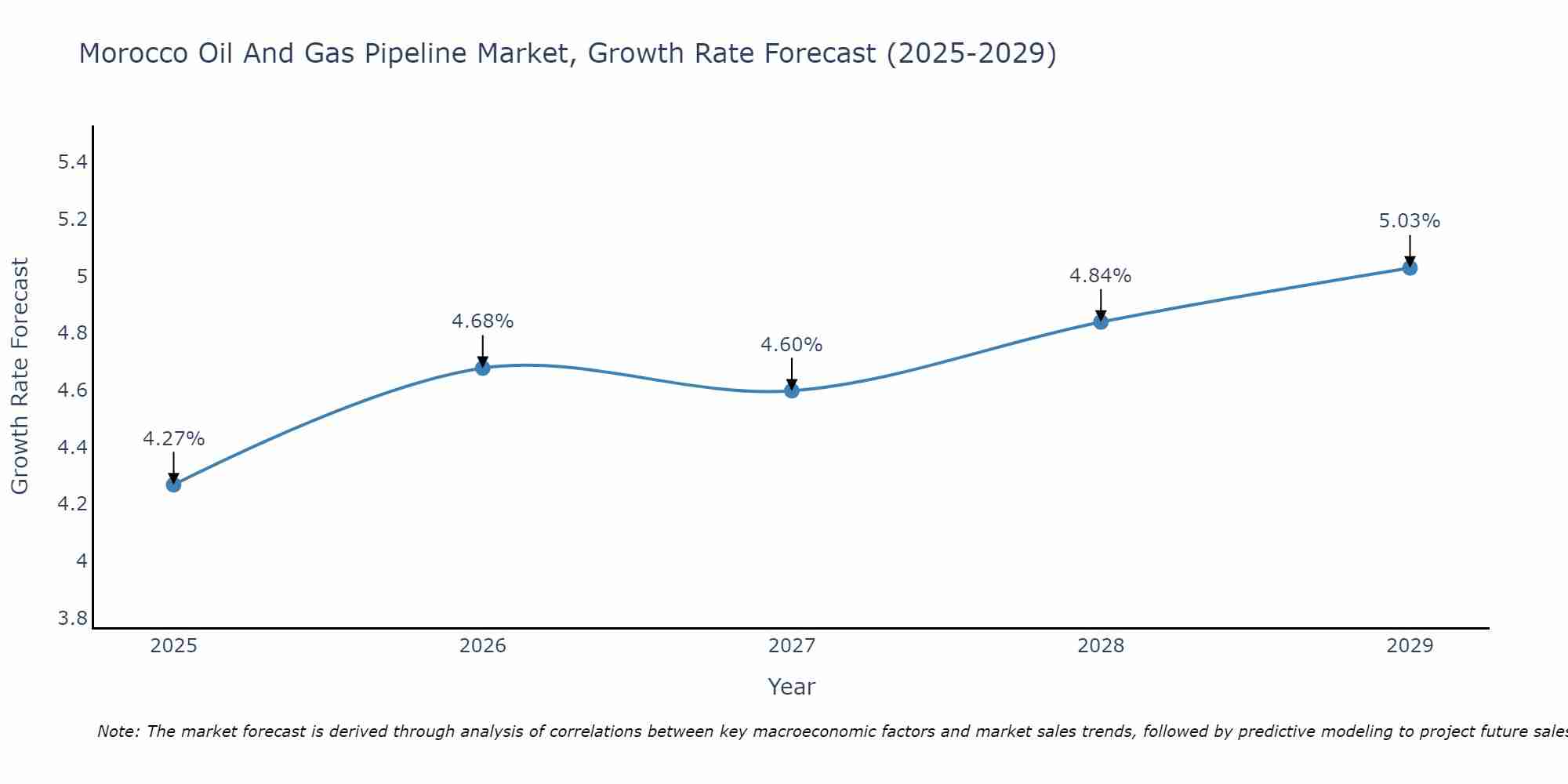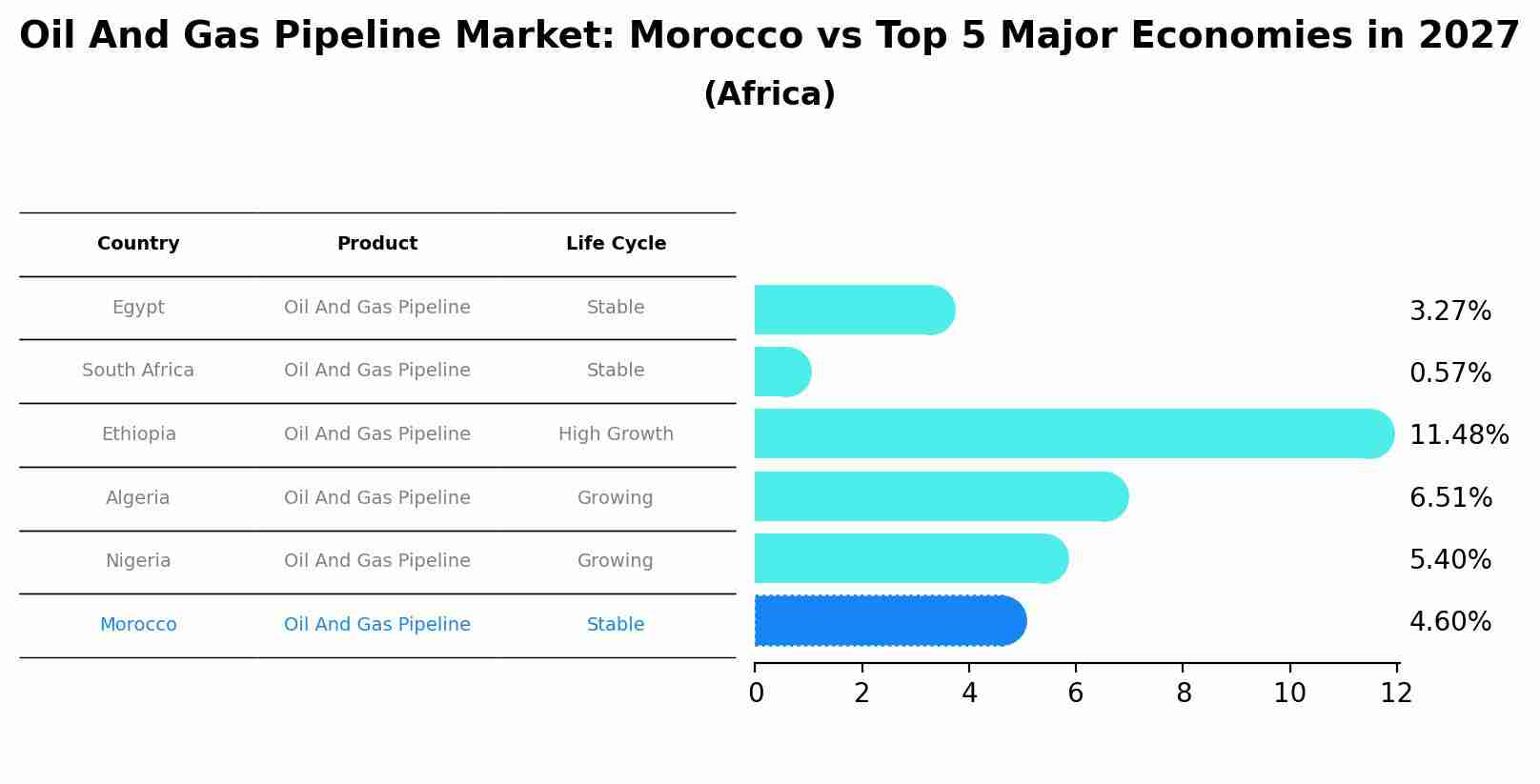Morocco Oil And Gas Pipeline Market Outlook | Size, Forecast, Companies, Growth, Industry, Share, Revenue, Analysis, Trends, COVID-19 IMPACT & Value
| Product Code: ETC377333 | Publication Date: Aug 2022 | Updated Date: Jul 2025 | Product Type: Market Research Report | |
| Publisher: 6Wresearch | Author: Shubham Deep | No. of Pages: 75 | No. of Figures: 35 | No. of Tables: 20 |
Morocco Oil And Gas Pipeline Market Size Growth Rate
The Morocco Oil And Gas Pipeline Market is projected to witness mixed growth rate patterns during 2025 to 2029. Commencing at 4.27% in 2025, growth builds up to 5.03% by 2029.

Oil And Gas Pipeline Market: Morocco vs Top 5 Major Economies in 2027 (Africa)
In the Africa region, the Oil And Gas Pipeline market in Morocco is projected to expand at a stable growth rate of 4.60% by 2027. The largest economy is Egypt, followed by South Africa, Ethiopia, Algeria and Nigeria.

Morocco Oil And Gas Pipeline Market Synopsis
The Morocco Oil and Gas Pipeline Market is a growing sector driven by the country`s increasing energy demand and strategic geographical location. The market is characterized by the presence of both onshore and offshore pipeline projects aimed at transporting oil and gas resources efficiently across the country. As Morocco continues to invest in expanding its energy infrastructure, there is a rising focus on enhancing pipeline connectivity and capacity to meet domestic consumption and facilitate exports. Key players in the market are investing in pipeline construction and maintenance to meet the growing demand for oil and gas transportation. Government initiatives to promote energy infrastructure development and attract foreign investments further contribute to the positive outlook of the Morocco Oil and Gas Pipeline Market.
Morocco Oil And Gas Pipeline Market Trends
The Morocco Oil and Gas Pipeline Market is experiencing a shift towards investment in infrastructure development to meet the growing energy demand in the region. The market is witnessing an increased focus on the expansion and modernization of pipeline networks to enhance transportation capacity and efficiency. Additionally, there is a growing emphasis on the use of advanced technologies such as digitalization and automation to optimize operations and improve safety standards. With the government`s push towards renewable energy sources, there is also a rising interest in developing pipelines for natural gas and alternative energy sources. Overall, the Morocco Oil and Gas Pipeline Market is evolving towards sustainability, innovation, and diversification to meet the changing energy landscape and support economic growth in the region.
Morocco Oil And Gas Pipeline Market Challenges
In the Morocco Oil and Gas Pipeline Market, some of the key challenges include regulatory hurdles and environmental concerns, as the country seeks to balance the need for energy infrastructure development with sustainable practices. Additionally, the market faces competition from other energy sources such as renewable energy, which could potentially impact the demand for oil and gas pipelines. Limited investment in pipeline infrastructure, geopolitical risks, and fluctuating oil prices also present challenges for the market. Moreover, the complex geopolitical landscape in the region, including tensions with neighboring countries and uncertainties in international trade relations, can impact the stability and growth of the oil and gas pipeline market in Morocco. Overall, navigating these challenges requires strategic planning, collaboration with stakeholders, and a focus on innovation and sustainability in the industry.
Morocco Oil And Gas Pipeline Market Investment Opportunities
The Morocco oil and gas pipeline market presents various investment opportunities, including infrastructure development projects to expand the country`s pipeline network, investment in technology for pipeline monitoring and maintenance, and partnerships with international companies for exploration and production activities. With growing energy demand in the region and Morocco`s strategic location as a gateway between Europe and Africa, there is potential for significant returns on investments in the oil and gas pipeline sector. Additionally, the Moroccan government is actively promoting investment in the energy sector through favorable policies and incentives, further enhancing the attractiveness of the market for potential investors looking to capitalize on the country`s energy infrastructure growth and increasing demand for oil and gas products.
Jordan Agar Market Government Policies
The government of Morocco has implemented several policies to support the development of the oil and gas pipeline market in the country. These policies include promoting investment in the sector through favorable regulations and incentives, encouraging the use of advanced technologies for pipeline construction and maintenance, and ensuring compliance with environmental and safety standards. Additionally, the government has established partnerships with international organizations and other countries to enhance the efficiency and reliability of the pipeline infrastructure. Overall, these policies aim to attract investments, promote growth, and strengthen the energy security of Morocco through the expansion and modernization of its oil and gas pipeline network.
Morocco Oil And Gas Pipeline Market Future Outlook
The future outlook for the Morocco Oil and Gas Pipeline Market appears promising, driven by increasing investments in the country`s energy infrastructure and a growing demand for oil and gas products. With Morocco`s strategic location as a gateway between Europe and Africa, there is potential for expansion and development of pipeline networks to facilitate the transportation of oil and gas resources. Additionally, the government`s focus on diversifying the energy mix and promoting renewable energy sources may lead to opportunities for pipeline projects related to natural gas distribution. Overall, the Morocco Oil and Gas Pipeline Market is likely to witness steady growth in the coming years, supported by infrastructure development initiatives and the country`s strategic positioning in the energy sector.
Key Highlights of the Report:
- Morocco Oil And Gas Pipeline Market Outlook
- Market Size of Morocco Oil And Gas Pipeline Market, 2021
- Forecast of Morocco Oil And Gas Pipeline Market, 2031
- Historical Data and Forecast of Morocco Oil And Gas Pipeline Revenues & Volume for the Period 2018 - 2031
- Morocco Oil And Gas Pipeline Market Trend Evolution
- Morocco Oil And Gas Pipeline Market Drivers and Challenges
- Morocco Oil And Gas Pipeline Price Trends
- Morocco Oil And Gas Pipeline Porter's Five Forces
- Morocco Oil And Gas Pipeline Industry Life Cycle
- Historical Data and Forecast of Morocco Oil And Gas Pipeline Market Revenues & Volume By Location of Deployment for the Period 2018 - 2031
- Historical Data and Forecast of Morocco Oil And Gas Pipeline Market Revenues & Volume By Onshore for the Period 2018 - 2031
- Historical Data and Forecast of Morocco Oil And Gas Pipeline Market Revenues & Volume By Offshore for the Period 2018 - 2031
- Historical Data and Forecast of Morocco Oil And Gas Pipeline Market Revenues & Volume By Type for the Period 2018 - 2031
- Historical Data and Forecast of Morocco Oil And Gas Pipeline Market Revenues & Volume By Crude Oil Pipeline for the Period 2018 - 2031
- Historical Data and Forecast of Morocco Oil And Gas Pipeline Market Revenues & Volume By Gas Pipeline for the Period 2018 - 2031
- Morocco Oil And Gas Pipeline Import Export Trade Statistics
- Market Opportunity Assessment By Location of Deployment
- Market Opportunity Assessment By Type
- Morocco Oil And Gas Pipeline Top Companies Market Share
- Morocco Oil And Gas Pipeline Competitive Benchmarking By Technical and Operational Parameters
- Morocco Oil And Gas Pipeline Company Profiles
- Morocco Oil And Gas Pipeline Key Strategic Recommendations
Frequently Asked Questions About the Market Study (FAQs):
- Single User License$ 1,995
- Department License$ 2,400
- Site License$ 3,120
- Global License$ 3,795
Search
Thought Leadership and Analyst Meet
Our Clients
Related Reports
- Canada Oil and Gas Market (2026-2032) | Share, Segmentation, Value, Industry, Trends, Forecast, Analysis, Size & Revenue, Growth, Competitive Landscape, Outlook, Companies
- Germany Breakfast Food Market (2026-2032) | Industry, Share, Growth, Size, Companies, Value, Analysis, Revenue, Trends, Forecast & Outlook
- Australia Briquette Market (2025-2031) | Growth, Size, Revenue, Forecast, Analysis, Trends, Value, Share, Industry & Companies
- Vietnam System Integrator Market (2025-2031) | Size, Companies, Analysis, Industry, Value, Forecast, Growth, Trends, Revenue & Share
- ASEAN and Thailand Brain Health Supplements Market (2025-2031) | Strategy, Consumer Insights, Analysis, Investment Trends, Opportunities, Growth, Size, Share, Industry, Revenue, Segments, Value, Segmentation, Supply, Forecast, Restraints, Outlook, Competition, Drivers, Trends, Demand, Pricing Analysis, Competitive, Strategic Insights, Companies, Challenges
- ASEAN Bearings Market (2025-2031) | Strategy, Consumer Insights, Analysis, Investment Trends, Opportunities, Growth, Size, Share, Industry, Revenue, Segments, Value, Segmentation, Supply, Forecast, Restraints, Outlook, Competition, Drivers, Trends, Demand, Pricing Analysis, Competitive, Strategic Insights, Companies, Challenges
- Europe Flooring Market (2025-2031) | Outlook, Share, Industry, Trends, Forecast, Companies, Revenue, Size, Analysis, Growth & Value
- Saudi Arabia Manlift Market (2025-2031) | Outlook, Size, Growth, Trends, Companies, Industry, Revenue, Value, Share, Forecast & Analysis
- Uganda Excavator, Crane, and Wheel Loaders Market (2025-2031) | Strategy, Consumer Insights, Analysis, Investment Trends, Opportunities, Growth, Size, Share, Industry, Revenue, Segments, Value, Segmentation, Supply, Forecast, Restraints, Outlook, Competition, Drivers, Trends, Demand, Pricing Analysis, Competitive, Strategic Insights, Companies, Challenges
- Rwanda Excavator, Crane, and Wheel Loaders Market (2025-2031) | Strategy, Consumer Insights, Analysis, Investment Trends, Opportunities, Growth, Size, Share, Industry, Revenue, Segments, Value, Segmentation, Supply, Forecast, Restraints, Outlook, Competition, Drivers, Trends, Demand, Pricing Analysis, Competitive, Strategic Insights, Companies, Challenges
Industry Events and Analyst Meet
Whitepaper
- Middle East & Africa Commercial Security Market Click here to view more.
- Middle East & Africa Fire Safety Systems & Equipment Market Click here to view more.
- GCC Drone Market Click here to view more.
- Middle East Lighting Fixture Market Click here to view more.
- GCC Physical & Perimeter Security Market Click here to view more.
6WResearch In News
- Doha a strategic location for EV manufacturing hub: IPA Qatar
- Demand for luxury TVs surging in the GCC, says Samsung
- Empowering Growth: The Thriving Journey of Bangladesh’s Cable Industry
- Demand for luxury TVs surging in the GCC, says Samsung
- Video call with a traditional healer? Once unthinkable, it’s now common in South Africa
- Intelligent Buildings To Smooth GCC’s Path To Net Zero


















